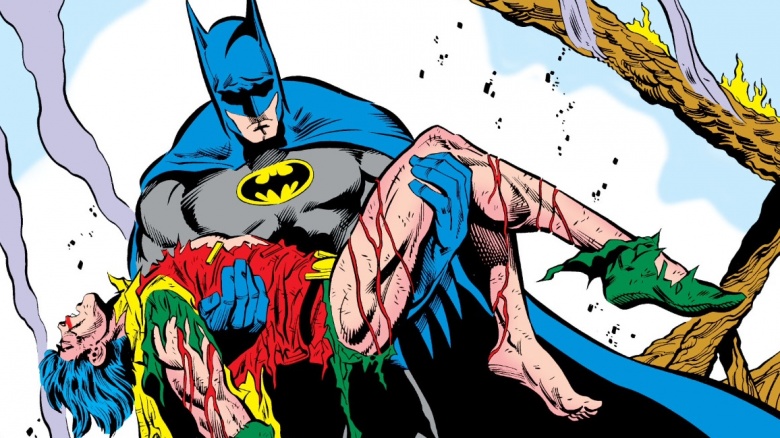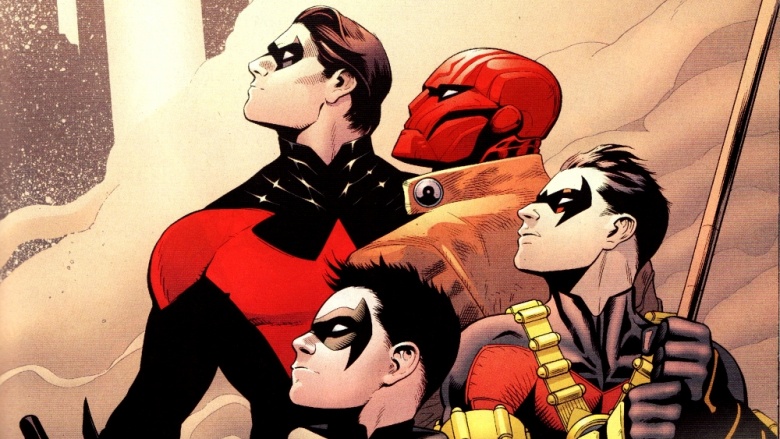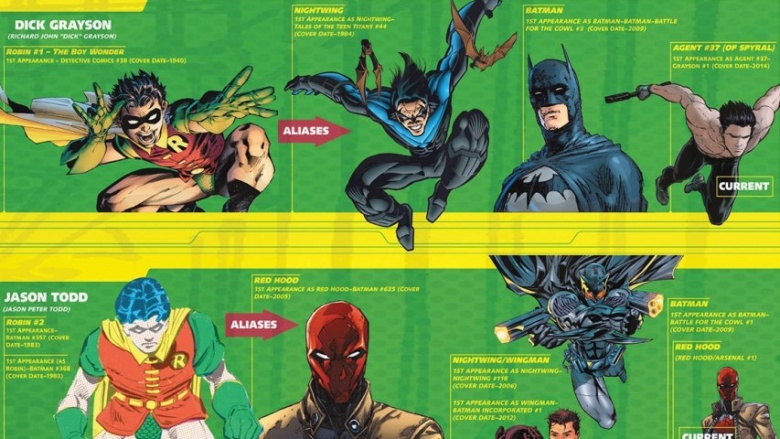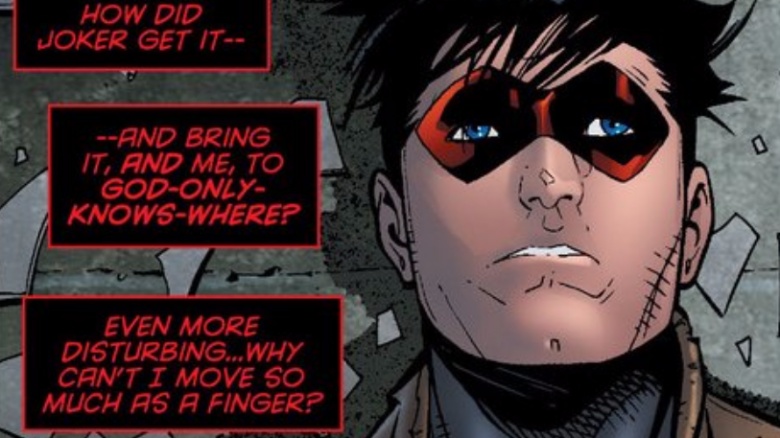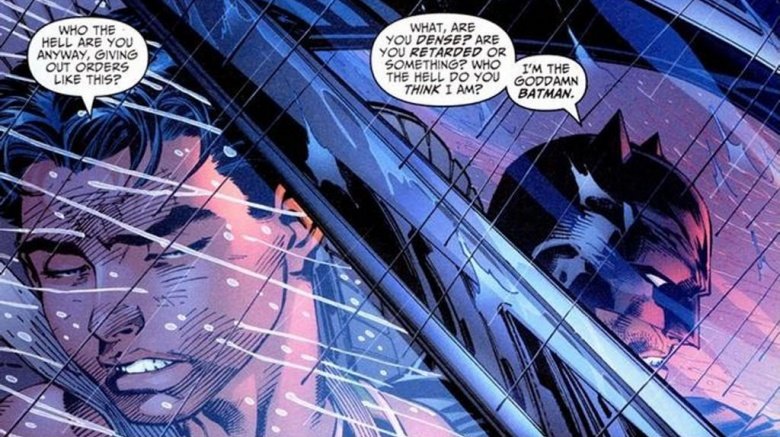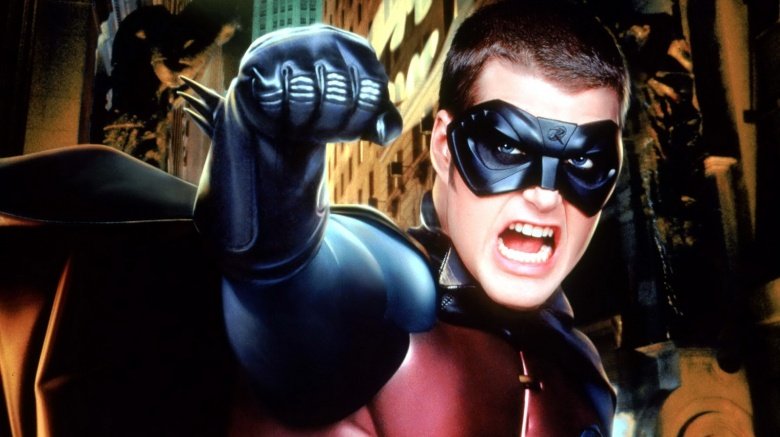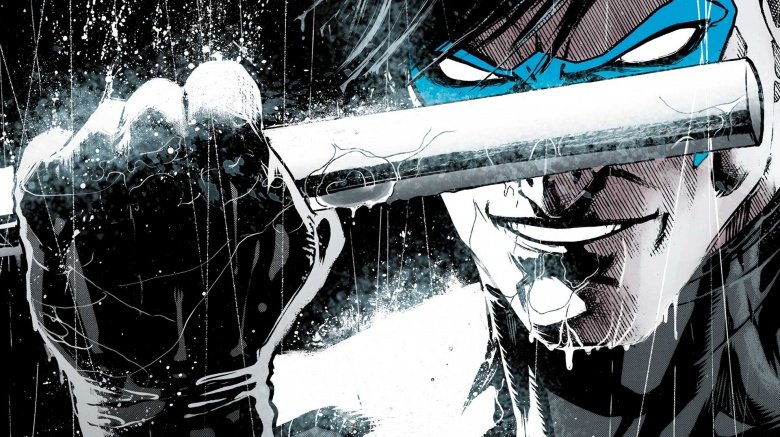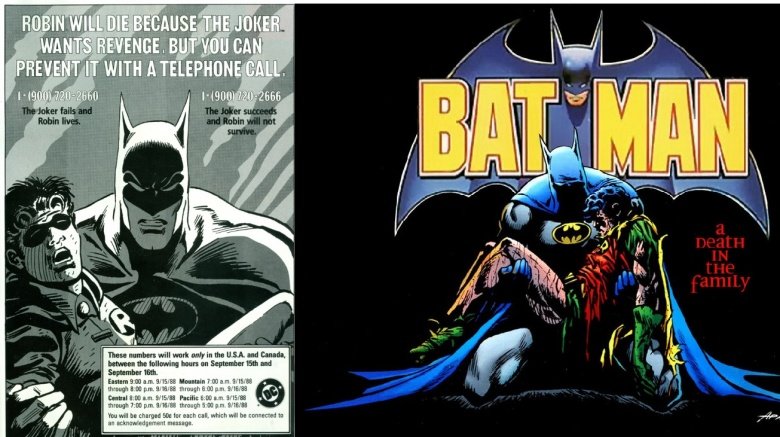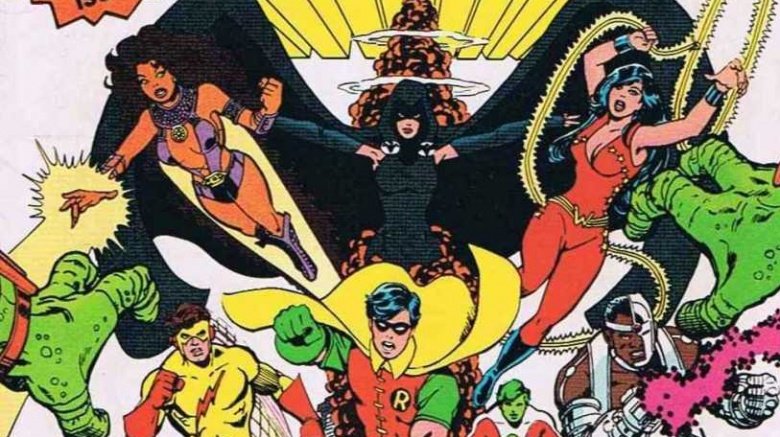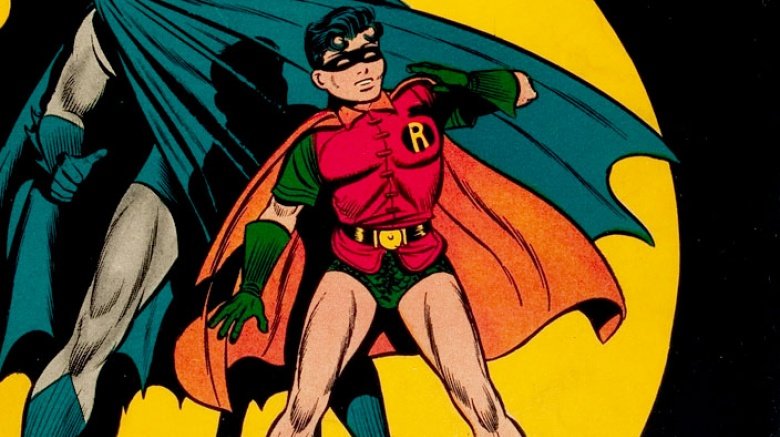Why DC Won't Make A Robin Movie
For Robin fans, hopes have been growing that he might get his own solo movie. After all, the character was teased in Batman v Superman and then mentioned outright in Suicide Squad. And, of course, it's tough to go very far without seeing our favorite spandex sidekick, whether it's on the obnoxiously infectious (or infectiously obnoxious; your choice) Teen Titans Go! or headlining some of DC's animated movies such as Batman vs. Robin and Justice League vs. Teen Titans. However, this is a false hope, and while Robin-related miracles can happen (Batman did eventually let him wear pants), the truth is that DC has already killed the chance of a Robin movie, and it didn't even require a crowbar!
He's dead
Perhaps the most direct reason DC isn't going to make a Robin movie is that the character has already been killed. In Batman v Superman, fans glimpse a different uniform in the Batcave that is vandalized by The Joker with the message "Hahaha Joke's on you Batman." Many fans assumed this meant Robin was dead, which was casually confirmed in the Suicide Squad movie. That movie popped up "cards" full of facts to help introduce its villainous cast of characters to audiences, and Harley Quinn's card confirms that she is responsible for Robin's death. Fans may point out that she killed Jason Todd (canonically, he is the second Robin of the comics) and that there might be a future Robin introduced, but this goes against Batman's arc of these movies: Batman v Superman presents a rage-filled loner (remember all those people the "doesn't kill" hero kills in that movie?) who is seeking redemption and fellowship via the Justice League he decides to form. The essential role of Robin, to mellow Batman out, is completely unnecessary.
Which Robin to choose?
Another major issue with a Robin movie is that there have been so darn many Robins. How do you pick one? No matter the choice, it will certainly anger some major portion of Warner Bros.' and DC's fan base. They cannot feature Jason Todd without explaining how he's back from the dead, something that might stretch our notion of death and permanence after seeing the Man of Steel rise from the grave and join the Justice League. They could go with Dick Grayson, then, as he is the original Robin. However, Batman v Superman presented us with an older Batman — by now, teen sidekick Dick Grayson should have grown into his adult heroic persona, Nightwing. They can try to use Tim Drake, the third Robin, but it would feel weird to suddenly have a movie about this tertiary Boy Wonder without seeing much of anything about Todd or Grayson. There's also Damian Wayne, a controversial Robin who is also the son (mostly) of Bruce Wayne and Talia al Ghul. However, this would require introducing and explaining Ra's al Ghul all over again, which would hurt Warner Bros. as they try to separate these movies from Nolan's iconic Batman movies that came before.
Too much backstory
As hinted at above, another huge issue with a standalone Robin movie is the need to introduce us to the character. Think about it: the movies would need Robin to appear in one of the standalone Batman movies. To do that, he needs to be introduced, and DC must do the whole backstory and origin thing so moviegoers understand who he is. In that movie, or possibly a couple of movies, he needs to establish himself as popular enough to carry a movie on his own, doing so in the shadow of Oscar-winning Ben Affleck as Batman. Then, and only then, can fans get a standalone Robin movie. The blunt truth is that it's difficult for sidekicks to escape the cinematic shadow of their mentors. As an example, fans have had three Captain America movies to see the full origin and arc of the Winter Soldier. But Marvel hasn't felt compelled to give him a solo movie because he serves much better to help us understand Captain America than as his own character, and Robin is the same way when it comes to the Caped Crusader. It's a bit cynical, but it may also come down to marketing: a compelling sidekick can help sell a lot of Batman toys, but solo movie sidekick merchandise is likely to keep a long and lonely vigil over the toy shelves.
The prequel problem
Here's another interesting pickle that a Robin movie can't really overcome. It would almost certainly have to be a prequel. The smart money would be to give us a prequel focusing on what happened to Jason Todd, which would also be an excuse to heavily feature fan favorites Joker and Harley Quinn. So, what's the problem with a Robin prequel?
Two words: forward momentum. With the size of the universes these studios are tasked with bringing to the big screen, there isn't very much time for origin story prequels. Why do you think Batman got shoved into a Superman sequel? Because Warner Bros. and DC are barreling full speed ahead toward a Justice League movie and there wasn't time to tell a prequel story, even one set in the same universe. Instead, Batman's origin is slipped into the opening credits, and as that other Joker might say, "Here ... we ... go!" You can see this with Marvel Studios as well. With the exception of Captain America's very cool origin story movie, the Marvel Cinematic Universe hasn't spent much time here either. Dr. Strange would have made a lot of sense if it started before the first Iron Man in order to explain how long Strange has studied the mystic arts, but because of the need for forward momentum and Strange's upcoming appearances in future movies, his own origin was significantly compressed. A Robin prequel would flesh out someone we never see again and bring with it the distracting problem of making all the supporting characters a number of years younger. Because Jason Todd is already dead, there's zero chance Warner Bros. will halt that momentum toward future Justice League movies in order to give him a solo prequel movie.
The tone problem
Many people point to trigger-happy, murder-happy Batman in Batman v Superman and conclude that Zack Snyder has a Batman problem. Hell, when he's screaming about Martha, he's only a step removed from the infamous All-Star Batman who liked to proclaim, "I'm the goddamn Batman." But Synder doesn't have a Batman problem. In truth, he has a tone problem, which is why there's no room for a Robin movie.
Snyder made a creative choice for both Man of Steel and Batman v Superman: this is a dark, gritty, and serious cinematic universe. This is why Superman and Batman both kill; this is why Jimmy Olsen is brutally murdered. Hell, this is why Superman only smiles twice in all of Batman v Superman. Robin, as fans know him, doesn't really fit in this universe. The original comics character was introduced to lighten up a serious Batman comic, as the gun-toting, murder-happy Batman of the Golden Age had his rough edges sanded by a silly teenage sidekick. Why couldn't a Robin movie do the same for this universe? He's redundant. When teasing Justice League footage, Snyder went out of his way to show the humor of The Flash and other characters. So a Robin prequel would be completely out of place with the horrifically grim universe fans got before, and a Robin in the modern movies has no place if the tone is already being lightened up.
The age problem
Age in comic books is something of a moving target. Some characters are perpetually a certain age (Comics Batman has been about 34 or 35 for most comics fans' lives), while others age at a weird pace (some of the once-young X-men are in their 30s now; it only took about five decades for them to age 18ish years). The age of our movie superheroes is much more set in stone, but that actually presents a bit of a problem when it comes to a Robin movie.
For example, if the movie does end up being a prequel, it would likely feature the most iconic Robin that comics fans know: the plucky teenage sidekick. This means a major multimillion-dollar tentpole would be headlined by a teenage boy. It would basically be Spy Kids but with a cape, which is a tough sell for any audience, and even tougher for the more mature audience Warner Bros. and DC have tried to cultivate with movies like Suicide Squad. The movie could feature an older Robin, such as a pre-death Jason Todd, but then you run into the other age problem of Batman and Robin being too close in age (just look at the forgettable Batman Forever, in which Val Kilmer and Chris O'Donnell come off more as bickering brothers than a father-figure and his adopted son).
Why not just have Bruce Wayne adopt a new sidekick in the present day? Well, Batman is established as being in his mid-40s, and it may come off as odd for him to adopt someone a quarter of his age, knowing that his last sidekick died a violent death at the hands of criminals who are still at large.
The Nightwing dilemma
Upon hearing that the comics Batman has had so many Robins, it's natural for very casual fans to wonder what the hell happened to the others, especially Dick Grayson, the original Robin. The simple answer is that the character grew up, with the teen sidekick growing into his own man and eventually growing into his own hero. Robin became Nightwing, who went on to have his own adventures with the Teen Titans and to protect a new city — Bludhaven.
If Warner Bros. was to produce a Robin movie, it shouldn't be a Robin movie at all. Instead, it should be a Nightwing movie. However, this brings in all of the nested problems mentioned before, as it would be jarring to suddenly establish that brutal loner Batman has a former teen sidekick running around. Once again, we would need to establish the origin of Robin being adopted by Bruce Wayne and then the origin of Nightwing becoming his own hero and man. If you're counting along at home, that's two origin stories jammed into one movie during a climate where fans usually don't have the patience for even one origin (just ask the Spider-Man fans practically begging Marvel to not show them a third cinematic Spider-Man origin in 15 years).
The public doesn't want it
Perhaps the most direct and blunt reason that there won't be a Robin movie is that the public doesn't really want it. Historically, the character has received some strong opinions from fans, with many of them being negative. For instance, the character of Jason Todd wasn't killed by Zack Snyder. He was originally killed by fans. For the Death in the Family four-part Batman story, one issue ended with the Joker beating Jason Todd's Robin nearly to death with a crowbar and then leaving him locked in a building that exploded. DC Comics left his ultimate fate up to fans by allowing them to dial a number and vote for Todd to either live or die. It was close, but fans decided to kill Jason Todd, and he stayed dead for a good long time. (But not indefinitely, because no one stays dead in comics except Uncle Ben.)
One of the most recent Robins, Damian Wayne, was a thoroughly unlikable character, created as a League of Assassins-trained little brat. Grant Morrison designed him that way and eventually decided to kill the character, which left more than a few fans quite happy at his absence. A Robin movie, then, has to either overcome the baggage of this annoyance and anger toward these other Robins or the aforementioned backstory baggage of trying to bring in the more well-liked Dick Grayson.
He works better in large ensembles
The idea of a Robin movie suffers because Robin, like many comics characters, works better as part of an ensemble. Narratively, sidekicks can get away with this because they don't have to be their own fully realized characters. Instead, they just have to be reflections of the primary hero. A Robin movie would inevitably be compared to the cinematic Batman. This is understandable because the character is often presented as Batman Lite.
Put another way, there is a reason that many know Robin from the Teen Titans. In an ensemble of other young heroes, Batman Lite works because it's part of his identity. They are a group of sidekicks struggling to find individual identity, so Robin inevitably has more of a story arc among the titans. These arcs include romance with Starfire, learning to accept a leadership role, and finding his place among a larger group. Such ensembles also allow a welcome tonal shift. For instance, the Teen Titans Go! cartoon finds a lot of humor in the idea of someone trying to be Batman while also being a goofy teenager in brightly colored spandex. In a Robin solo movie, none of this works: bringing other characters into the movie effectively makes it a movie about the team rather than about the character, which is what a good solo movie is supposed to focus on.
The problem of location
The final problem with a Robin movie is the difficulty of figuring out where to set it. It seems like a no-brainer to set the movie in Gotham City, but that brings its own set of assumptions. Fans will want to see familiar Gotham villains and/or heroes, which brings us back to the idea that a Robin movie wouldn't really feel distinct: if audiences are watching a caped hero traipse about Gotham City and fight Joker, Harley, and Deadshot, they'll want to cut the middleman out and just watch a Batman movie. It seems logical, then, to set it in a different location — a Robin establishing himself in Bludhaven, perhaps, or on the road with his old circus family. However, Warner Bros. has been very hesitant about getting too separate from its tentpoles of Batman and Superman: Batman couldn't be established without tethering him to a Superman sequel, and Suicide Squad seemingly couldn't go two scenes without a flashback or reference to Batman, who also appears to tease the next movie after the credits, just in case anyone forgot what universe they were watching. Ultimately, this is a tightwire even Dick Grayson can't really navigate. Audiences don't want a diet Batman movie, nor do they want completely separate movies about spandex-clad teenage superheroes. Or if they do, they're too busy clearing their search history to admit it.
